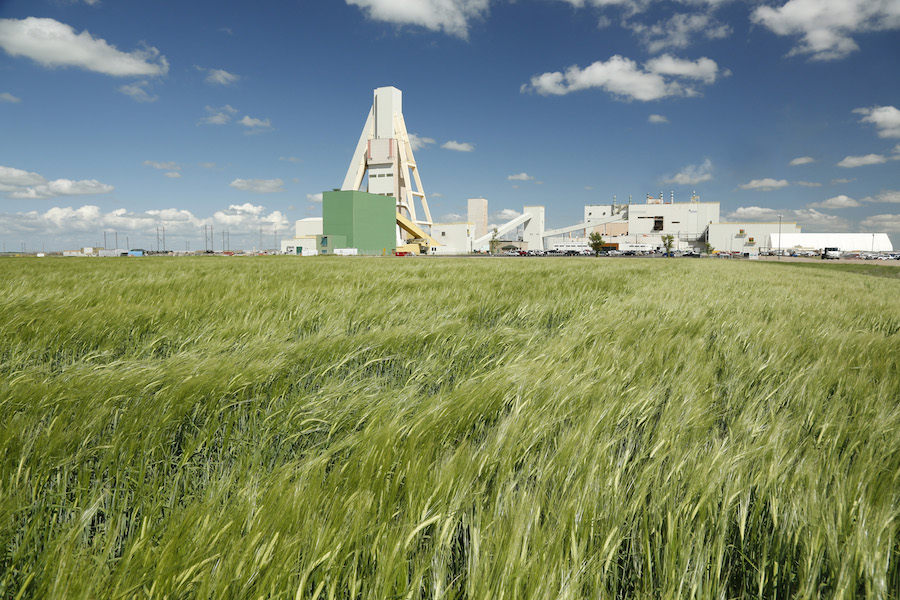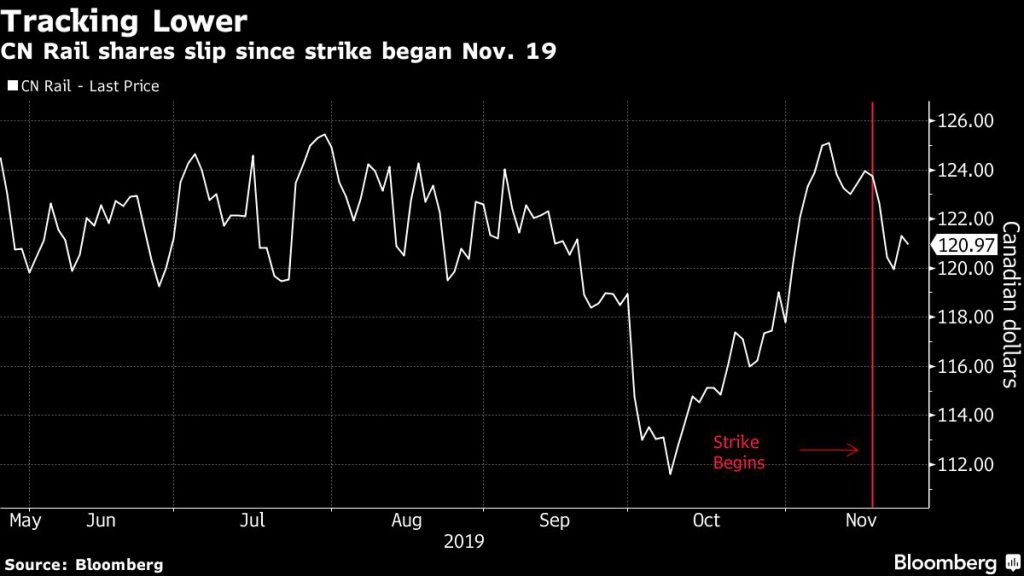Nutrien’s potash mine closure adds to bite of Canada rail strike

The world’s largest fertilizer producer plans to temporarily close its biggest potash mine as the impact of a Canadian rail strike continues to spread.
Nutrien Ltd. said Monday it notified workers of a two-week shutdown starting Dec. 2 at its Rocanville mine in the western Canadian province of Saskatchewan. About 550 of 600 employees are expected to be laid off.
Global potash markets have been weak this year, which has already prompted Nutrien to curtail production at some of it’s other Saskatchewan mines
It’s the latest sign that the strike by 3,200 conductors and railyard operators that began on Nov. 19 at Canadian National Railway Co. is starting to bite. Ships are waiting for grain off the West coast and the Montreal Port Authority reported cargoes of grain, sugar, minerals and bulk liquids are stalled on CN convoys.
“It is extremely disappointing that in a year when the agricultural sector has been severely impacted by poor weather and trade disputes, the CN strike will add further hardship to the Canadian agriculture industry,” Chuck Magro, chief executive officer of Saskatoon, Saskatchewan-based Nutrien said in a statement. “Any further disruption will be harmful to our business, the Canadian economy, and Canada’s competitive position and reputation as a reliable supplier of fertilizer and food.”
More layoffs
The shutdown equates to about 250,000 tons of potash production, according to Alexis Maxwell, a research director for Bloomberg Green Markets. Global potash markets have been weak this year, which has already prompted Nutrien to curtail production at some of it’s other Saskatchewan mines.
More furloughs are looming. In Halifax, Nova Scotia, on Canada’s east coast, the Unifor union said it received notice that 70 workers at a CN Rail autoport facility, which handles car distribution across North America, will be laid off as of Thursday due to the strike. The Chemical Industry Association of Canada also predicted companies would soon be shutting down operations and laying off workers.
Port delays
About 12 vessels are waiting for grain in English Bay and another four in the Gulf Islands off the west coast of Vancouver, according to the Port of Vancouver.
“Things will really start to escalate at this point,” Mark Hemmes, president of grain monitor Quorum Corporation, said in a phone interview. “You can get away with a week or maybe 10 days, and see some recoverability.”
Jonathan Abecassis, a spokesman for CN, said negotiations continue and reiterated a call for binding arbitration. The network is operating at about 10% capacity, CN has said. A representative for the Teamsters Canada Rail Conference union didn’t immediately return calls.
The government, which faces calls from provinces and industry groups to force strikers back to work, has so far repeated a preference for a negotiated settlement.
The dispute, over working conditions and benefits, is threatening to hobble Canada’s export industries and stunt its already weakening growth. The strike could shave off almost a quarter-point from growth this quarter if it lasts through Dec. 5, according to Toronto-Dominion Bank economists. That’s when lawmakers, who have the power to break the impasse, return to parliament.
CN shares were down 0.3% at C$120.98 at 2 p.m. in Toronto and have lost about 2.3% since the strike began on Nov. 19.

Farmers in Montreal also marched to Prime Minister Justin Trudeau’s constituency office in the city on Monday to urge the government to find a way to end the strike.
An increasing number of grain producers have run out of propane and have little choice but to let crops rot in the fields, with financial losses in sight, said Patrice Juneau, a spokesman for the Quebec farmers union, L’Union des producteurs agricoles. Small animals such as piglets or chicks also can’t survive without heating, he said.
Some companies are starting to pitch in. Calgary-based Pembina Pipeline Corp. said in a statement Sunday that it plans to ship propane to parts of Canada, including Quebec. It’s preparing unit trains, made up of 105 cars, with propane sourced from western Canada. “Pembina’s facility is the only one in Canada capable of amassing these quantities of propane and building such unit trains,” the company said in its release.
(By Sandrine Rastello and Ashley Robinson, with assistance from Natalie Obiko Pearson)
More News
Contract worker dies at Rio Tinto mine in Guinea
Last August, a contract worker died in an incident at the same mine.
February 15, 2026 | 09:20 am
{{ commodity.name }}
{{ post.title }}
{{ post.date }}




Comments